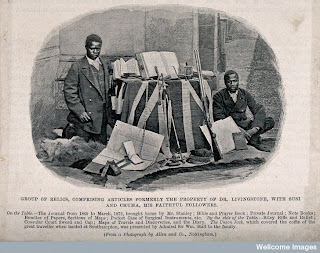In my first published piece in March, 2012, I had suggested that the 200th anniversary of the birth of David Livingstone might provide an opportunity to critically assess the Scottish traveller's original intention to go to Africa, his years spent in Central and Southern Africa and the subsequent legacy of his life and work.
So it has turned out that this suggestion had been taken up when, from the 19th to the 21st of April last, a three-day international conference, Imperial Obsessions: David Livingstone, Africa and world history: a life and legacy reconsidered, organised by the London School of Economics, took place in Livingstone, Zambia.
In December 1991, an article: David Livingstone and the imperial imagination, written by Brooke Allen, appeared on-line in The Free Library.
Here are the first two paragraphs from that article:
“David Livingstone had a lasting effect upon the way Britons in the nineteenth century and beyond would look at primitive peoples and at themselves. Today it is the man and not his writings that we remember, but the three books by Livingstone which were published during the Victorian era left a powerful mark on the public imagination and helped eventually to create an ethos that would become, temporarily, the accepted moral foundation of the British Empire in Africa. The books themselves, written before England had begun to think about Africa in fully imperial terms, were the product of a knowledgeable, eclectic, passionate and opinionated mind.
Livingstone was one of the last of the great Victorians to be debunked, and even at this late moment in the twentieth century that process continues to be a half-hearted one. Oliver Ransford's David Livingstone, the Dark Interior presents Livingstone, not altogether convincingly, as a manic-depressive; but the overall tenor of the book is that of hero-worship. Tim Jeal's 1973 biography is certainly the most comprehensive and credible work on Livingstone, and its portrait of a man driven by ambition and the egoism of his own vision to ruthlessness and sometimes cruelty is ultimately convincing. But even Jeal never puts into question the largeness of Livingstone's vision or the quality of his faith. His Livingstone, though human, is still a great man.” Full article.
Allen, Brooke. "David Livingstone and the imperial imagination." The Free Library 22 December 1991.
Those of us who couldn’t get the chance to be at the conference look forward to the publication of the proceedings.




